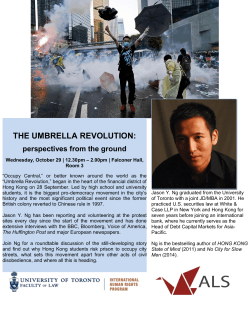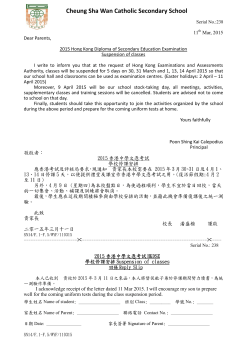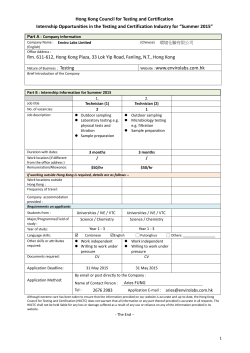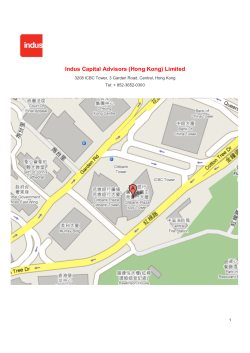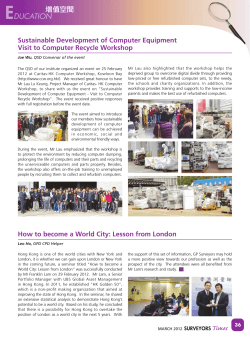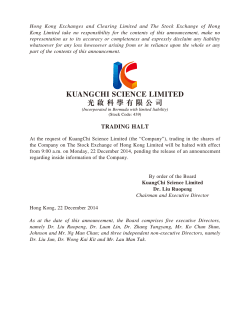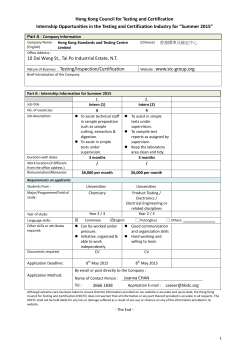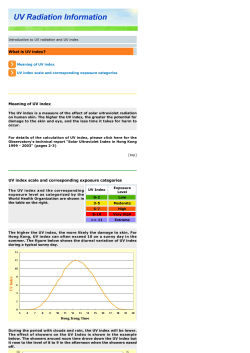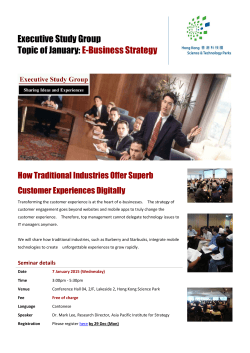
Nobel Cause Symposium HK Press Release
“Developing our cities, preserving our planet”: Nobel Laureates gather for the first time in Asia Symposium on Global Sustainability launches in Hong Kong (Hong Kong 23 April) Nobel Laureates across the world and across disciplines this week are gathering in Hong Kong to elevate the debate on climate change to a new level and to feed into the world climate summit in Paris later this year. For the first time, the Nobel Laureates are meeting in Asia for the symposium, “4C: Changing Climate, Changing Cities”. Cities are key to addressing the challenge of climate change which, if unabated, might result in a 4°C rise in mean temperature by the end of this century. Participants of the symposium include Nobel Prize winners Yuan T. Lee (Chemistry, 1986) from Taiwan, Brian Schmidt (Physics, 2011) from Australia, and James A. Mirrlees from the United Kingdom (Economics, 2006), complemented by international renowned experts such as K.S. Wong, Secretary for the Environment, The Government of the Hong Kong Special Administrative Region, and Aromar Revi of the Indian Institute for Human Settlements. Co-hosted by the Potsdam Institute for Climate Impact Research and the Asia Society Hong Kong Center, the symposium is being generously supported by J.P. Morgan, Robert Bosch Stiftung, The Hong Kong Jockey Club and others. The symposium sessions will be available on Live Webcast. “Some of our planet’s brightest minds, a number of Nobel Laureates, will debate answers to what they deem to be one the greatest challenges of our times: manmade climate change,” says symposium initiator Hans Joachim Schellnhuber, Director of the Potsdam Institute for Climate Impact Research. “Cities – particularly the rapidly growing ones in Asia – are at the heart of the issue, and Hong Kong in many ways could be a laboratory of change. We trust that thriving nations such as China and Germany will help in cutting global greenhouse gas emissions and hence confine the otherwise immense risks of global warming. To preserve our planet for generations to come, and to include those who are at the margins of our societies today and suffer most from environmental damage, we need more than economic growth – we need sustainability, including a new vision for urbanization.” Half of the world’s population already lives in cities today. Urban areas contribute over-proportionally to climate change; roughly 75% of CO2 emissions from burning fossil fuels are caused in cities. At the same time, it is the cities that are especially vulnerable to climate change. Buildings and streets have a greater heat uptake than forests or fields, so heat waves can mean substantial risks to public health. Extreme rains can exceed drainage capacities of cities and cause flooding. Air pollution from coal-powered plants and cars already is causing major health issues. Many of the world’s great metropolises, such as New York, Shanghai, and Mumbai, are prone to the effects of sea-level rise as they lie on the coast. “Across continents, we work towards a common goal,” says Ronnie C. Chan, Chairman of the Asia Society Hong Kong Center and co-host of the Symposium. “We are privileged to convene such a distinguished group of scientists, thinkers and experts. The Asia Society’s mission is to educate and stimulate, so the symposium provides a non-partisan platform for a select group of speakers to engage in thoughtprovoking and informative discussion – resulting in a memorandum that will not just serve as a benchmark in environmental and urbanization research policy but raise awareness among key decision-makers and stakeholders around the world.” The participating Nobel Laureates feel the responsibility to speak out. “While the climate scientists have provided us with a firm diagnosis and recommendations for the necessary ‘treatment,’ it is up to all who have even the slightest influence to encourage everyone, and particularly those with power, to practice ‘preventive medicine’ for all life on this planet,” says Peter Doherty, awarded with the Nobel Prize for Medicine. “Climate change impacts are of course not limited to health issues, but there are direct medical manifestations such as increasing heat stress from heat waves. More importantly maybe, there are indirect effects due to hunger as a consequence of unpredictable severe weather patterns, or the spreading of insect borne diseases such as Malaria or Chikungunya from the tropics to other regions. Climate change is a risk multiplier, science is very clear about that - so it's about time to bring solutions into life,” Peter Doherty added. During the symposium, a team led by Penny Sackett from the Australia National University will meet daily to discuss and finalize a memorandum that will carry the message of risks and opportunities for cities to mayors worldwide as well as to stakeholders, businesses and policy-makers. It will be finalized on Saturday the 25th of April and will be signed at 14:30. There will be a press Photo Op at that time. A copy of the memorandum will be released to the press and will also be available on the websites of the Potsdam Institute for Climate Impact Research Nobel Laureates Symposium and the Asia Society Hong Kong Center. For more information about the symposium, please see here and click here for live webcast. For more information on the symposium, please contact: External Affairs, Asia Society Hong Kong Center Tara Duffy Phone: +85221039578 Email: mediahk@asiasociety.org Communications, Potsdam Institute for Climate Impact Research Jonas Viering Phone: +491793998862 Email: press@pik-potsdam.de About the co-organizers: Founded in 1956 by John D. Rockefeller 3rd in New York, The Asia Society is a leading not-for-profit, non-government educational organization dedicated to promoting mutual understanding and strengthening partnerships among peoples, leaders, and institutions of Asia and the United States in a global context. Across the fields of arts, business, culture, education, and policy, The Asia Society provides insight, generates ideas, and promotes collaboration to address present challenges and create a shared future. As one of the eleven centers of Asia Society, the Asia Society Hong Kong Center (the “Center”) was established in 1990 by a group of Hong Kong community leaders, led by the late Sir Q.W. Lee, the honorary chairman of Hang Seng Bank. In 2012, the Center established its new permanent home in Admiralty, Hong Kong. Through conservation, rehabilitation and adaptive re-use of a group of historic structures on a former British military site, the new center premises combines heritage conservation with a distinctive modern aesthetic, complete with world-class arts, performance and conference facilities. These facilities enable the Center to offer a broad selection of programs in the form of lectures, performances, film screenings and gallery exhibitions to members of the public. The Potsdam Institute for Climate Impact Research, founded in 1992 and based in Potsdam/Germany, is one of the worldwide leading research centers in its field. A staff of more than 300 from both the natural and social sciences work together to generate interdisciplinary insights and to provide society with sound information for decision making. The main methodologies are systems and scenarios analysis, computer simulation and data integration. The research results get published in peer-reviewed international scientific journals. The institute’s core funding is provided by the Federal Government of Germany and the State of Brandenburg. Its director Professor Hans Joachim Schellnhuber initiated the Nobel Laureates Symposium Series and brought it to London, Stockholm, and now Hong Kong. About the sponsors and supporters that the organizers wish to thank: Lead Sponsors JPMorgan Chase & Co. is a leading global financial services firm with operations worldwide. The Firm is a leader in investment banking, financial services for consumers and small businesses, commercial banking, financial transaction processing, asset management and private equity. JPMorgan Chase & Co. serves millions of consumers in the United States and many of the world's most prominent corporate, institutional and government clients under its J.P. Morgan and Chase brands. Robert Bosch Foundation. Established in 1964, the Robert Bosch Stiftung GmbH is one of the major German foundations associated with a private company. It represents the philanthropic and social endeavors of Robert Bosch (1861–1942) and fulfills his legacy in a contemporary manner. The Robert Bosch Stiftung works predominantly in the fields of international relations, health and education, and the aims and objectives of modern science. The Hong Kong Jockey Club. Founded in 1884, The Hong Kong Jockey Club is a world-class horse racing operator and Hong Kong’s largest community benefactor, operating as a not-for-profit organisation. Committed to global excellence and giving back to society, the Club is always “riding high together for a better future” with the people of Hong Kong. Supporting Sponsors CLP Group: CLP Holdings Limited, a company listed on the Hong Kong Stock Exchange, is the holding company for the CLP Group, one of the largest investor-owned power businesses in Asia Pacific. Through CLP Power Hong Kong Limited, it operates a vertically-integrated electricity supply business providing a highly-reliable supply of electricity to 80% of Hong Kong’s population. Climate-KIC is the EU’s main climate innovation initiative. It is Europe’s largest public-private innovation partnership focused on mitigating and adapting to climate change. Climate-KIC consists of companies, academic institutions and the public sector. The organisation has its headquarters in London, UK, and leverages national and regional centres across Europe to educate students and professionals, to support start-up companies and to bring together partners on innovation projects to bring about a connected, creative transformation of knowledge and ideas into products and services that help mitigate and adapt to climate change. http://www.climate-kic.org Giti Group is a diversified group active in manufacturing, real estate and consumer lifestyle in AsiaPacific. It founded the largest auto tire operations in China and South-East Asia. Stiftung Mercator is a private foundation which fosters science and the humanities, education and international understanding. It specifically initiates, develops and funds projects and partner organizations in the thematic fields to which it is committed: it wants to strengthen Europe, improve integration through equal educational opportunities for everyone, drive forward the energy transition as a trigger for global climate change mitigation and firmly anchor cultural education in schools. Stiftung Mercator is committed to reducing the human-caused emissions of greenhouse gases included in the Kyoto Protocol by 40 percent in Germany by 2020 and by at least 80 percent by 2050, measured against the 1990 levels. The Volkswagen Foundation is an independent non-profit foundation established under private law. With an annual funding volume of around 150 million euros it is the largest private science funding foundation in Germany. It supports the humanities and social sciences as well as science and technology in higher education and research. The foundation places a special focus on providing support for junior scholars and scientists and fostering cooperation between researchers across the borders of disciplines, cultures, and national states. Shuttle services generously provided by BMW ###
© Copyright 2025
